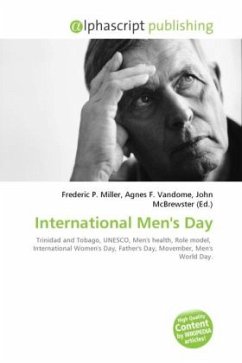
International Literacy Day
Versandkostenfrei!
Versandfertig in 6-10 Tagen
30,99 €
inkl. MwSt.

PAYBACK Punkte
15 °P sammeln!
September 8 was proclaimed International Literacy Day by UNESCO on November 17, 1965. It was first celebrated in 1966. Its aim is to highlight the importance of literacy to individuals, communities and societies. On International Literacy Day each year, UNESCO reminds the international community of the status of literacy and adult learning globally. Celebrations take place around the world. Some 776 million adults lack minimum literacy skills; one in five adults is still not literate and two-thirds of them are women; 75 million children are out-of-school and many more attend irregularly or dro...
September 8 was proclaimed International Literacy Day by UNESCO on November 17, 1965. It was first celebrated in 1966. Its aim is to highlight the importance of literacy to individuals, communities and societies. On International Literacy Day each year, UNESCO reminds the international community of the status of literacy and adult learning globally. Celebrations take place around the world. Some 776 million adults lack minimum literacy skills; one in five adults is still not literate and two-thirds of them are women; 75 million children are out-of-school and many more attend irregularly or drop out. According to UNESCO s "Global Monitoring Report on Education for All (2008)", South and West Asia has the lowest regional adult literacy rate (58.6%), followed by sub-Saharan Africa (59.7%), and the Arab States (62.7%). Countries with the lowest literacy rates in the world are Burkina Faso (12.8%), Niger (14.4%) and Mali (19%). The report shows a clear connection between illiteracy and countries in severe poverty, and between illiteracy and prejudice against women.












